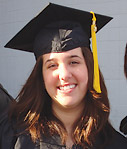Lauren Fine was a computer science major when she realized she wasn’t just interested in programming.
“I wasn’t solely interested in developing software,” Fine says. “I was also interested in seeing how people use it.”

In 2008, around the time of Fine’s revelation, U-M launched a new undergraduate major: Informatics.
“Informatics seemed like the perfect balance between the technological and social aspects of my interests,” Fine says.
In December, she became the first graduate of the interdisciplinary program, a collaboration among LSA, the College of Engineering and the School of Information.
Today 58 students are enrolled in the four-year major with a strong foundation in mathematics, statistics, computer science and social research methodology, says Kerby Shedden, chair of the Informatics faculty steering committee. Shedden is an associate professor in the Department of Statistics, which houses the program.
More than just a series of “how-to” courses about information systems, Shedden says U-M’s curriculum is one of only a handful of integrated cross-disciplinary undergrad informatics programs in the nation.
Informatics is the study of information and how people and social systems use it. At U-M, students can choose from four concentrations: computational informatics, data mining and information analysis, life science informatics, and social computing.
More online
For more information about the Informatics program go to informatics.umich.edu.
Fine focused on social computing, or how people use technology to interact. Her favorite classes were “Design of Complex Websites,” and “Evaluation of Systems and Services,” where she was introduced to usability testing. That’s where she hopes to focus her efforts in the future.
Students like Fine are entering a world with unprecedented volume and complexity of data, Shedden says.
“Companies and organizations such as Google and Wikipedia have scratched the surface of this by giving people some power to search and manipulate complex data sets like Web databases,” Shedden says. “But this is a very dynamic area, and in a few years what we are doing now will seem primitive. We want to make sure that Michigan students are prepared to take part in what is going to become a major point of innovation in the global economy.”
After graduation Fine moved to Seattle, where she is interviewing for a job.

